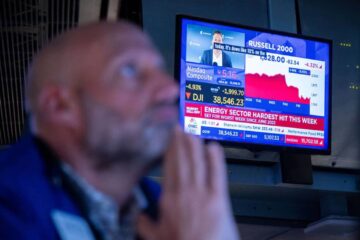U.S. stocks have outperformed their overseas brethren for years. So now might be a good time to consider getting into foreign markets.
One expert who favors that idea is Julian McManus, co-manager of Janus Henderson Overseas Fund (JAOSX) , a mutual fund with $3.6 billion in assets. Janus Henderson as a whole had $361 billion of assets under management as of June 30.
The Overseas Fund posted returns of 23% for the 12 months ended Sept. 26, 5% for three years, 11% for five years and 5% for 10 years.
Julian McManus, co-manager of the Janus Henderson Overseas Fund.
Janus Henderson
For the same time frames ended June 30, the fund beat the MSCI All Country World ex-USA Index in each one.
We recently chatted with McManus about his investment philosophy and stock picks as part of our Expert Interview series.
He stressed the diversification that foreign stocks provide from U.S. equities. Foreign stocks that can provide above-market returns at below-market risks are available, he said.
McManus likes some stocks in the defense, semiconductor and banking industries. Here’s what he had to say.
Janus Henderson Overseas Fund investment philosophy
TheStreet.com: What’s your investment philosophy?
McManus: It centers on owning companies where free-cash-flow growth is undervalued by the market, and there’s no persistent style bias. This approach defies systematization. We isolate stock selection, not risk factors, as the primary driver of alpha [excess return above benchmarks].
TheStreet.com: What’s the attraction of foreign stocks?
McManus: They offer diversification from U.S.-specific risks — the commercial real estate refinancing cliff, for example. They also offer exposure to uniquely advantaged businesses, some of which are trading at very attractive levels.
These stocks can drive above-market returns at below-market risk.
Related: Single Best Trade: Veteran fund manager picks Chinese stock
TheStreet.com: We know you’re bottom-up investors, but are there any geographies, industries or market themes that you like?
McManus: We currently find attractive opportunities across the globe, from banks in India and Japan, to companies in various levels of the semiconductor supply chain.
Defense is also an industry with improving fundamentals and prospects for growth. Yet it still trades at low valuations. That reflects the post-Cold-War peace dividend of the past rather than the higher growth, higher [profit] margin future.
Sign up for TheStreet’s free daily newsletter.
The Street.com: Are there any areas you shy away from?
We tend to shy away from areas where governance risks can mean permanent impairment of capital. This means certain emerging markets, which face economic and political problems.
We never invested in Russia. Argentina, Mexico and Brazil also can fall into this bucket depending on the political regime of the day.
We also will not invest in tobacco stocks, given the adverse health consequences of tobacco consumption.
Related: $7 billion fund manager chooses Amazon and other growth stocks
McManus’ stock picks
TheStreet.com: Can you discuss three of your favorite stocks?
McManus:
1. Taiwan Semiconductor (TSM) , the world’s largest and most critical logic semiconductor foundry. It’s responsible for making the cutting-edge chips that drive the businesses of household names like Nvidia, Apple, Amazon Web Services and Google.
Scale and process technology advantages have reached a tipping point, such that Intel and Samsung can’t keep up, and are likely only to fall further behind TSMC.
That means TSMC’s growth rates will reflect those of Apple, Nvidia and other high-performance computing companies in the future. And TSMC’s margins are expected to rise, as its pricing power increases.
All this is underappreciated by the market, which prices TSMC at 16 times forward earnings, compared to 30 for Apple and 40 for Nvidia.
Fund manager buys and sells:
Experts cite stocks to buy after Fed rate cutCathie Wood divests $23 million of surging tech stocksTop value fund manager says Alphabet is deep-value stock
2. BAE Systems (BAESY) , [the largest defense contractor in Europe, based in the U.K.] It’s also attractively valued because [the stock price is still influenced] by the peace dividend following the cold war. That translated to little to no growth for defense budgets outside of the U.S.
But now there have been geopolitical shifts, such as the U.S. Defense Department pivoting to the Pacific, Russia invading Ukraine, and conflict in the Middle East. So the global urgency for defense spending is rising sharply, especially outside the U.S.
However, due to long-term underspending by these countries on their military readiness, there is a significant catchup that needs to occur. BAE Systems is one company which has positioned itself well for this change, investing in the platforms that will be most critical.
Despite this change, the equity market has only just begun to rerate BAE, and we will likely see many years of above average growth at rising margins.
Related: Goldman Sachs reviews stock targets after Fed interest rate cut
3. HDFC Bank (HDB) , one of the best-managed banks in India. The long-term outlook for growth in Indian banking is robust. Both annual return on equity and lending growth are likely to continue in the high teens [percentage points].
However, HDFC is in the midst of merging with its large subsidiary, housing lender HDFC Corp. Both are excellent businesses in their own right. But sentiment has cooled on the stock, as quarterly earnings have been less smooth than in the past.
Investors with shorter time horizons have stepped out of the stock, leaving it at an undemanding multiple of 18 times earnings. For a company which has historically grown its earnings 15% to 20% annually, that’s attractive.
Related: Veteran fund manager who correctly forecast stock drop updates outlook


